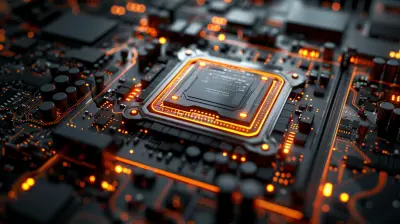Exploring the Future of Quantum Computing: What It Means for Everyday Users
6 January 2025
Quantum computing—sounds like something straight out of a science fiction novel, right? The term alone makes you picture futuristic labs, scientists in lab coats, and complex algorithms no one outside the tech world could ever hope to understand. But what if I told you that quantum computing isn't just for scientists or tech geniuses anymore? In fact, it's starting to inch its way into the everyday lives of regular users like you and me.
So, what exactly is quantum computing? How does it work? And more importantly, what does it mean for the future of everyday users like us? Let’s dive into this fascinating topic and see what the future holds.

What Exactly Is Quantum Computing?
Before we zoom into the future, let’s first break down what quantum computing actually is. Don’t worry—I'm not going to bore you with technical jargon. Let’s keep it simple.Think of your regular computer, the one you're probably using to read this article. It processes information in binary—ones and zeroes. These ones and zeroes, called "bits," are the building blocks of all the calculations and operations your computer performs. But here’s the catch: a bit can either be a 1 or a 0, but never both at the same time.
Now, quantum computers? They play by a different set of rules. Instead of bits, they use "qubits." The magic of qubits is that they can exist as both a 1 and a 0 at the same time, thanks to something called "superposition." It sounds weird, I know, but this allows quantum computers to process an insane amount of information at once.
We’re talking about a whole new level of computing power—one that can solve problems in seconds that would take traditional computers years to figure out. Quantum computers are like regular computers on steroids. But, while this sounds amazing, what does it mean for you?

Quantum Computing and Everyday Users: The Connection
Right now, quantum computing is in its infancy, and most regular folks don’t have a quantum computer sitting in their living room (yet). But that doesn’t mean it won’t affect us. In fact, as quantum technology evolves, it could revolutionize the way we live, work, and even play.Let’s break it down into some everyday scenarios where quantum computing could make a huge difference.
1. Faster and More Efficient Internet
Ever had a day when your Wi-Fi just refuses to cooperate? Maybe you’re trying to stream your favorite show, but it keeps buffering. Or perhaps you’re attending a Zoom meeting, and your video keeps freezing. Frustrating, right?Quantum computing has the potential to change all of that. By leveraging the power of qubits, quantum algorithms could lead to faster and more efficient data transmission over the internet. This means smoother video streaming, faster downloads, and improved online experiences. Imagine never having to deal with lag again. Sounds like a dream come true, doesn't it?
2. Enhancing Artificial Intelligence (AI)
AI is already making its way into our daily lives—whether it's through virtual assistants like Siri and Alexa or personalized recommendations on Netflix and Spotify. But here’s the thing: current AI systems are still limited by the computational power of classical computers.With quantum computing, AI could leapfrog into entirely new capabilities. Picture this: smarter virtual assistants that not only understand your voice commands better but can also predict what you need before you even ask. AI could become so advanced that it feels like interacting with a human rather than a machine.
In the future, quantum-enhanced AI might help us solve incredibly complex problems—anything from predicting natural disasters to curing diseases. It’ll be your everyday tech, but on a whole new level.
3. Unbreakable Security
We all know how important cybersecurity is, especially when it comes to online banking, shopping, and keeping our personal information safe. But the truth is, current encryption methods aren’t foolproof. Hackers are getting smarter, and even the most secure systems can be breached.Quantum computing could change the game when it comes to security. Using something called “quantum encryption,” data could be protected in such a way that it becomes nearly impossible for hackers to break in. Quantum encryption leverages the principles of quantum mechanics to create security keys that are virtually unhackable.
Imagine never having to worry about your credit card info getting stolen online or your personal data being compromised. With quantum encryption, we could be moving toward a future where online security is airtight.
4. Revolutionizing Drug Discovery and Healthcare
Healthcare is another area where quantum computing could have a massive impact on our daily lives. Developing new drugs and treatments is a long, expensive, and complicated process. It involves running countless simulations and calculations, which can take years using traditional computers.Quantum computers, however, could dramatically speed up this process. They can simulate molecular structures and interactions much faster, allowing scientists to discover new drugs more quickly and accurately.
For everyday users, this could mean faster treatments for diseases, shorter clinical trials, and more personalized healthcare. You might even see a future where diseases that once took years to cure could be treated in just a matter of months.
5. Advanced Weather Forecasting
We all check the weather, whether it’s to plan our weekend hike or figure out if we need to carry an umbrella. But weather forecasting isn’t always accurate, is it? Sometimes, the predicted sunny day turns into a downpour, leaving you drenched and frustrated.Quantum computing could change that. With its ability to process enormous amounts of data at lightning speed, quantum computers could provide far more accurate weather predictions. These predictions wouldn’t just be for the next day; quantum systems could forecast weather weeks or even months in advance with a high degree of accuracy.
For everyday users, this could mean more reliable weather forecasts, which would be a game-changer, especially for industries like agriculture, transportation, and even tourism.

Quantum Computing: Still a Long Way to Go?
Alright, so quantum computing sounds pretty amazing. But here’s the thing—this technology is still in its early stages. It’s like a baby learning to walk. While scientists and researchers have made incredible strides, we’re still a few years (or maybe even decades) away from quantum computers becoming mainstream.Right now, quantum computers are extremely expensive, and they require specialized environments to operate. We’re talking about giant machines that need to be kept at near absolute-zero temperatures. Yeah, not exactly something you can set up in your garage.
But just like how classical computers started out as massive, room-filling machines and eventually shrank down to the laptops and smartphones we use today, there’s a good chance quantum computers will follow a similar trajectory. It’s only a matter of time before they become more accessible and affordable.

The Challenges of Quantum Computing
While the future of quantum computing looks promising, it’s not without its challenges.One of the biggest hurdles is "quantum error correction." Because qubits are so delicate, they can be easily influenced by their surroundings, which can lead to errors in calculations. Scientists are working hard to solve this issue, but it’s a tough nut to crack.
Another challenge is scalability. Right now, quantum computers are limited in the number of qubits they can use. For quantum computing to truly live up to its potential, we need machines with thousands—if not millions—of error-free qubits. And we’re not quite there yet.
But despite these challenges, progress is being made every day. Tech giants like IBM, Google, and Microsoft are investing heavily in quantum research, and we’re seeing breakthroughs that bring us closer to a quantum future.
So, What Does This Mean for You?
At this point, you might be wondering, “Okay, cool, but how does this actually affect my day-to-day life?” And that’s a fair question.While we’re not quite at the point where quantum computers will replace your laptop or smartphone, the impact of quantum computing will trickle down to everyday users in numerous ways. From faster internet speeds and more secure online transactions to advances in healthcare and AI, quantum computing has the potential to improve the quality of life for everyone.
Sure, it might take a little while before we’re all using quantum-powered devices at home, but the groundwork is being laid right now. And when the quantum revolution does happen, it could be just as impactful as the invention of the internet or the smartphone.
So, keep your eyes peeled because the future of quantum computing is closer than you think. And when it arrives, it’s going to change the world in ways we can only begin to imagine.
all images in this post were generated using AI tools
Category:
Computer HardwareAuthor:

Marcus Gray
Discussion
rate this article
21 comments
Mira Hernandez
Quantum computing: where our smartphones might finally get smarter than us! Get ready for a future where our glitches have glitches!
February 25, 2025 at 12:49 PM

Marcus Gray
Indeed! Quantum computing has the potential to revolutionize technology, making our devices far more capable and possibly altering our relationship with them. It's an exciting prospect!
Ainsley McElroy
Oh great, just what we needed—another complicated tech buzzword to make us feel even dumber! Quantum computing sounds delightful; I can hardly wait for my toaster to start calculating Pi while I’m just trying to toast my bagel. Who knew breakfast could be so quantum? Cheers to the future!
February 14, 2025 at 8:34 PM

Marcus Gray
I hear you! It can seem overwhelming, but quantum computing has the potential to simplify and enhance many everyday technologies—even if your toaster isn’t quite there yet!
Madalyn McLemore
Exciting times ahead for tech lovers!
February 2, 2025 at 9:41 PM

Marcus Gray
Absolutely! The advancements in quantum computing promise to revolutionize technology and enhance everyday experiences in ways we can only imagine.
Zanya Jacobs
Ah, yes, quantum computing—because who doesn't need their morning coffee brewed at the speed of light? Can't wait for my toaster upgrade!
January 26, 2025 at 12:51 PM

Marcus Gray
While it may sound like sci-fi, quantum computing has real potential to revolutionize various fields, making complex tasks faster and more efficient—even if it doesn't necessarily brew coffee at light speed!
Rivera McElveen
This article beautifully captures the promise of quantum computing for everyday users. It’s inspiring to think about how this technology might revolutionize our daily lives, making tasks easier and solving complex problems. Excited to see what the future holds!
January 21, 2025 at 4:23 AM

Marcus Gray
Thank you! I'm glad you found the article inspiring. The potential of quantum computing really is exciting, and I hope it will bring significant benefits to our daily lives.
Aubrey Bennett
Quantum computing isn't just a tech buzzword; it's the dawn of a revolutionary era. Expect unprecedented speed and problem-solving capabilities that will redefine industries and daily life. Embrace it or get left behind—this transformative technology is not waiting for anyone.
January 17, 2025 at 7:45 PM

Marcus Gray
Absolutely! Quantum computing promises to reshape our world, offering solutions to complex problems at unprecedented speeds. It's crucial for everyone to stay informed and adapt to this emerging technology.
Mallory Underwood
In quantum’s dance, our dreams take flight, Unlocking worlds with endless might. Tomorrow’s tech, today’s delight.
January 15, 2025 at 9:27 PM

Marcus Gray
Thank you! Your poetic take beautifully captures the potential of quantum computing to revolutionize our lives and unlock new possibilities.
Zephyrion Blevins
Fascinating insights! How will quantum computing actually impact our daily lives? I'm eager to see practical applications emerge soon!
January 13, 2025 at 11:31 AM

Marcus Gray
Thank you! Quantum computing has the potential to revolutionize areas like drug discovery, optimization problems, and cryptography, leading to faster solutions and new technologies that will enhance our daily lives in the near future. Stay tuned!
Amalia Sanders
This article opens a fascinating window into quantum computing's potential impact on our daily lives. I'm intrigued by how this technology could revolutionize everything from data security to complex problem-solving. Can’t wait to see how it evolves and affects us!
January 13, 2025 at 5:43 AM

Marcus Gray
Thank you! I'm glad you found the article engaging. Quantum computing indeed has the potential to transform many aspects of our lives, and I share your excitement about its future developments!
Grace Powell
Quantum computing: because regular computers just weren't confusing enough! Just imagine a future where your toaster calculates breakfast choices at light speed—too bad it still won't help you decide between toast or pancakes. Priorities, right?
January 12, 2025 at 9:14 PM

Marcus Gray
Thanks for your humorous take! Quantum computing may indeed add complexity, but it promises to revolutionize problem-solving in ways we can't yet imagine, potentially simplifying our decisions in the long run.
Archer Meyers
This article beautifully captures the potential of quantum computing. As we navigate this evolving landscape, it’s essential to consider how these advancements can enrich our daily lives and experiences.
January 12, 2025 at 1:16 PM

Marcus Gray
Thank you! I'm glad you found the article insightful. Quantum computing indeed holds great promise for enhancing our everyday lives.
Logan Snyder
This article brilliantly elucidates the transformative potential of quantum computing for everyday users. By demystifying complex concepts and highlighting practical applications, it offers a hopeful glimpse into a future where enhanced computational power could revolutionize everything from data security to personalized services. Exciting times ahead!
January 12, 2025 at 3:37 AM

Marcus Gray
Thank you for your thoughtful comment! I'm glad you found the article insightful and exciting. The future of quantum computing truly holds remarkable potential for everyone!
Liora Rhodes
Excited to see how quantum computing will revolutionize our daily lives! Can't wait for the future tech advancements ahead!
January 11, 2025 at 8:59 PM

Marcus Gray
Absolutely! Quantum computing holds immense potential to transform industries and enhance everyday experiences. Exciting times ahead!
Aurelia Wright
Quantum computing is poised to revolutionize our daily lives, transforming everything from data security to complex problem-solving. Embracing this technology now will empower everyday users to harness unprecedented computational power, driving innovation and efficiency like never before. Get ready!
January 10, 2025 at 7:19 PM

Marcus Gray
Thank you for your insightful comment! Indeed, as quantum computing advances, its potential to reshape our daily lives and enhance problem-solving capabilities is immense. Exciting times ahead!
Rhiannon McCabe
Quantum computing could revolutionize daily tech, enhancing everything from security to complex problem-solving for users.
January 10, 2025 at 12:51 PM

Marcus Gray
Absolutely! Quantum computing holds the potential to significantly transform daily technology, offering advanced security and unparalleled problem-solving capabilities that can greatly benefit users in their everyday lives.
Nadine Barker
Quantum computing: finally a way to procrastinate on an atomic level! Let's wait.
January 9, 2025 at 6:03 AM

Marcus Gray
Haha, great point! Quantum computing might just make procrastination even more fascinating!
Elijah McLanahan
Quantum leap: Your fridge gets smarter!
January 8, 2025 at 7:57 PM

Marcus Gray
Absolutely! Quantum computing could enable smarter appliances that optimize energy use and enhance convenience, making our daily lives more efficient.
Nora McClain
This article insightfully explores how quantum computing could revolutionize everyday technology by enabling faster problem-solving and improving data security. As advancements continue, we may see applications in fields like healthcare, finance, and logistics, ultimately enhancing user experiences and driving innovation across various sectors. Exciting times ahead!
January 8, 2025 at 12:30 PM

Marcus Gray
Thank you for your thoughtful comment! I completely agree—quantum computing holds immense potential to transform everyday technology and drive innovation in multiple fields. Exciting times indeed!
Honor Patel
While quantum computing promises revolutionary advancements, its real-world applications for everyday users remain speculative and potentially distant. Caution is warranted.
January 7, 2025 at 12:39 PM

Marcus Gray
Thank you for your insight! While it's true that many applications are still in development, ongoing research and early implementations suggest that quantum computing could soon enhance everyday tasks, from optimization problems to secure communication. Caution is important, but so is optimism about its potential.
Ulrich Gill
This article beautifully captures the potential of quantum computing. It's exciting yet daunting to think about its impact on our daily lives, reminding us to embrace change with hope.
January 6, 2025 at 9:25 PM

Marcus Gray
Thank you for your thoughtful comment! I'm glad you found the article inspiring. Embracing the possibilities of quantum computing is indeed crucial for our future.
Mia McLaurin
This article offers an insightful overview of quantum computing's potential impact on daily life. It's exciting to consider how this technology could revolutionize everything from security to problem-solving. Great read!
January 6, 2025 at 1:41 PM

Marcus Gray
Thank you for your feedback! I'm glad you found the article insightful. Quantum computing truly has the potential to transform our daily lives in remarkable ways.
MORE POSTS

Eco-Friendly Smart Speakers: Sustainable Choices for the Tech-Savvy

The Role of Heat Sinks and Thermal Paste in Maintaining System Performance

How Smart Speakers Are Changing the Way We Play Games

The Future of Handheld Consoles: A Closer Look

The Role of Social Media Integration in Modern Consoles

How to Secure Your Code with Developer-Focused Security Tools

A Beginner's Guide to Setting Up Your Smart Speaker

How to Simplify Development with Low-Code Toolkits

The Most Innovative Gadgets for a Connected Lifestyle

Voice Assistants in Healthcare: Aiding Patients and Professionals

Tech Innovations Powering the Electric Vehicle Revolution

How to Build a Versatile Lens Kit for Any Photography Style

The Ethical Dilemmas of Voice Assistant Technology